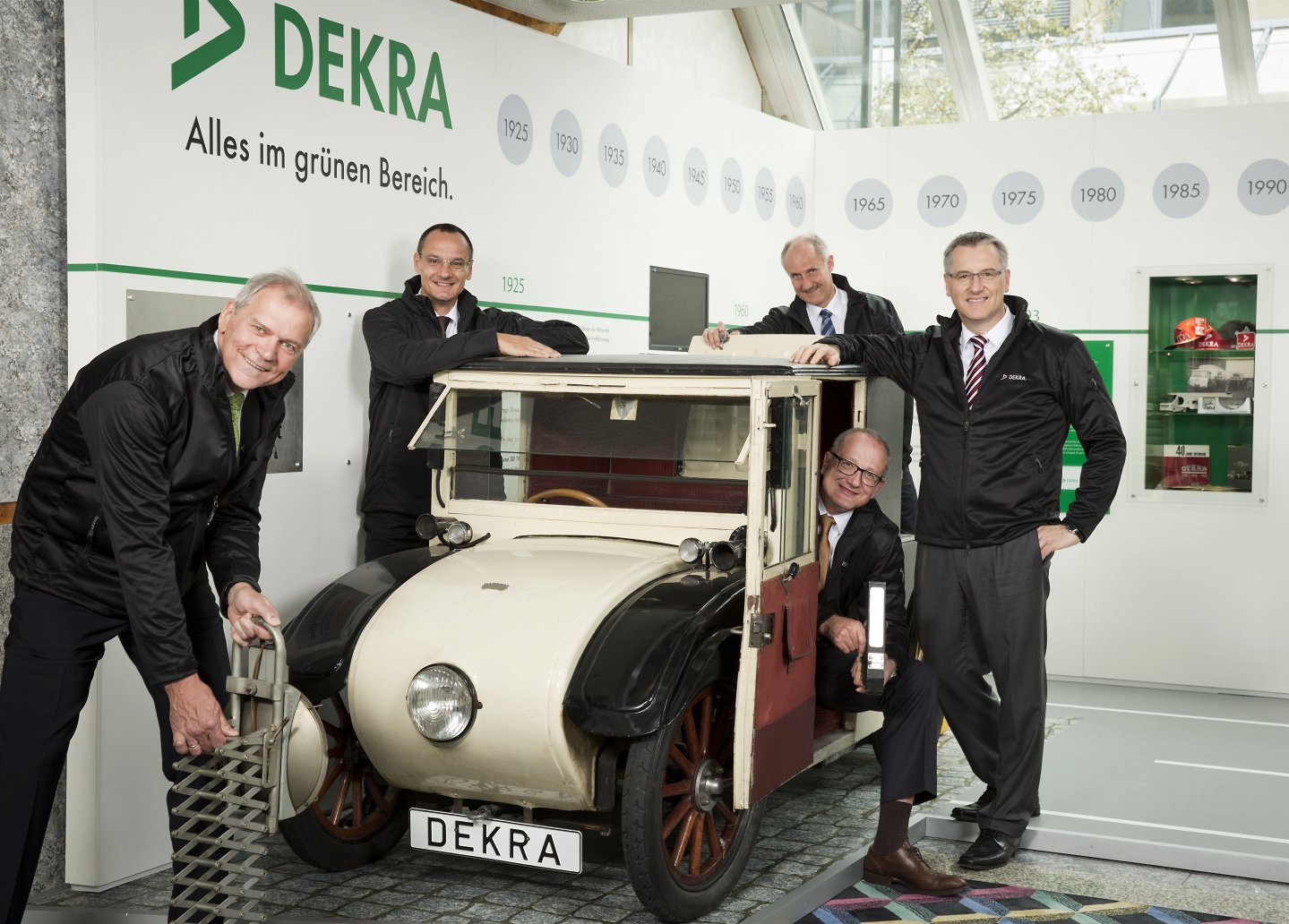![[Translate to English:] [Translate to English:]](https://image.dekra-arbeit.de/media/images/https%3A%2F%2Ftypo3.dekra-arbeit.de%2Ffileadmin%2Fuser_upload%2Fcsm_90_jahre_dekra_16a038e47f.jpg/400/image.webp)
News
90 Years DEKRA
- Founded on June 30, 1925 in Berlin
- “Mission security” enshrined in the articles of association
- Over 35,000 employees in 50 countries on all continents
On the road on behalf of safety for nine decades: the expert organization DEKRA is celebrating its 90th anniversary this year.
On June 30, 1925, the Deutsche Kraftfahrzeug-Überwachungs-Verein e.V. was entered in the register of associations at the Berlin-Mitte district court. 90 years later, it has become one of the world's leading expert organizations. More than 35,000 employees are active in 50 countries on all continents, and with 26 million vehicle inspections per year, DEKRA is by far the world's No. 1.The commitment to traffic and plant safety, which the founding fathers laid down in the association's statutes in 1925, is still the central concern of DEKRA e.V. and its subsidiaries today. Compared to the founding years, the company now understands its safety mission even more comprehensively and internationally. “As a globally positioned expert organization, we are committed to safety in traffic, at work and at home worldwide,” says Stefan Kölbl, Chairman of the Board of Management of DEKRA e.V. and DEKRA SE. “Our vision for the year 2025 is: We will be the global partner for a safe world.”
At the beginning of the 20th century, the industrial magnate Hugo Stinnes and other personalities from the German economy recognized the safety challenges resulting from rapid motorization and together they developed the idea of voluntary technical monitoring of motor vehicles, from which DEKRA was born. The mission is clearly formulated in the articles of association of the Deutscher Kraftfahrzeug-Überwachungs-Verein e.V.: “The purpose of the association is [...] to support and promote the operational and road safety of motor vehicles [...], the corresponding in relation to other systems and equipment and research in these areas.”
The idea quickly catches on and companies and public institutions with their own vehicle fleets join the association.DEKRA ensures the safety and reliability of the vehicles as a competent partner.DEKRA is represented with test centers at around 80 locations at the beginning of the 1930s.
Reconstruction in the post-war period
After the Second World War, rebuilding began in Stuttgart in 1946, and the number of branches and test centers grew rapidly.DEKRA was soon represented throughout the Federal Republic.The focus was initially on the testing of commercial vehicles and commercial fleets, especially those of its own members.
In 1960, the main inspection is introduced in its current form with the inspection sticker on the license plate.At practically the same time, DEKRA receives recognition as a monitoring organization.Since then, the experts have also been inspecting private cars, thus making a significant contribution to road safety.Since the end of the 1970s, DEKRA experts have also been carrying out main inspections in garages.
In den 1970er Jahren liegen auch die Anfänge der DEKRA Akademie.Aus ersten Schulungen für Berufskraftfahrer entwickelt sich in den folgenden Jahrzehnten eines der größten privaten Bildungsunternehmen in Deutschland.Die DEKRA Akademie schult und qualifiziert heute an 150 Standorten bundesweit jährlich mehr als 100.000 Menschen in den unterschiedlichsten Bereichen.
Internationalization and expansion in the East
DEKRA's internationalization begins with its involvement in France at the end of the 1980s: for the first time, vehicle inspections are offered in a neighbouring European country.
Shortly afterwards, with the fall of the Berlin Wall and reunification, a major challenge followed in Germany: on July 1, 1990, DEKRA was commissioned by the first freely elected government of the GDR to set up the Technical Inspection Agency in East Germany, and within a very short time a nationwide network of branches was established, making DEKRA the market leader to this day. The first tests are still carried out in tents, but these are equipped with the latest technology, and in October 1991 the one millionth test sticker is issued in the east. as a technical inspection body, DEKRA is also responsible for driving license tests in the eastern German states: By mid-2014, 10 million practical driving tests will have been carried out by DEKRA inspectors in the eastern German states.DEKRA celebrates a second anniversary at the same time as the 90th anniversary of the company as a whole: 25 years of the Technical Inspection Agency in the eastern German states.
DEKRA becomes an international brand
In 1990, a new legal framework is created to meet the challenging tasks of the future: The newly founded DEKRA AG takes over the operational activities of DEKRA e.V.
In the 1990s, DEKRA has a global presence through its sponsorship of Michael Schumacher in Formula 1, while at the same time the internationalization of the company continues: participations in the Czech Republic, Poland and Russia, and later also in Slovakia, Hungary and Italy, strengthen its presence in Europe, and by the end of the decade DEKRA is present in most EU countries - with vehicle inspections, expert reports, claims settlement and quality assurance.
In 1998, DEKRA Arbeit, a subsidiary of DEKRA Akademie, expands the range of services to include the promising field of temporary employment. 120 locations in Europe make the DEKRA Arbeit Group one of the leading organizations in the field of personnel services.
After 2000, the company strengthens its position in terms of technology: the state-of-the-art DEKRA Automobile Test Center (DATC) at the Eurospeedway Lausitz is put into operation in 2003 and, together with DEKRA Accident Research (founded in 1978) and the DEKRA Crash Test Center in Neumünster, bundles the expertise for customers from the automotive industry.
With its sponsorship commitments as Technical Partner of the DTM (since 1989) and as Official Partner of the DFB referees (since 2003), DEKRA increases brand awareness. At the same time, the company underlines its position as a neutral, independent third party in the service of safety and fair play.
Industrial testing business and safety consulting
At the beginning of the new millennium, DEKRA also strategically expands its industrial testing services:The spin-off of the business area into an independent business unit is followed in 2005 by the acquisition of NORISKO, a leading industrial testing service provider in France.2010 DEKRA AG adopts the legal form of a ‘Societas Europaea’ (SE). Further acquisitions in the automotive and industrial sectors follow, including in Brazil and Sweden. 2011 sees the opening of the new DEKRA House in Shanghai, and in the same year DEKRA takes over the French AutoContact Group and strengthens its international position in the used vehicle management sector.
With the acquisitions of the British explosion protection company Chilworth (2011) and the US specialist for behaviour-oriented process and organisational safety BST (2012), DEKRA significantly expands its position as a provider of safety consulting.Today, the consulting services of Chilworth and BST are bundled together with the company RCI Safety, which specialises in software solutions for occupational safety, in the DEKRA Insight unit.
In 2013, the Group takes over New Zealand's Vehicle Testing New Zealand (VTNZ), thus further expanding the automotive testing business internationally, and in South Africa DEKRA strengthens its offering in the industrial business with the acquisition of Raysonics, the market leader in non-destructive material testing. The acquisition of Dutch company Plurel B.V. in 2014 expands the Group's services for the railway industry. DEKRA Rail in the Netherlands and Germany is now one of the market leaders in the testing, inspection and certification of rail vehicles in Europe.
Global partner for a safe world
In its anniversary year, DEKRA's service portfolio ranges from vehicle inspections and appraisals to used car management, claims settlement, industrial and construction testing, safety consulting, product and system testing and certification, training programmes and temporary employment.
On the occasion of its 90th anniversary, DEKRA has clearly aligned itself for the future, says CEO Stefan Kölbl: "Safety is a central need of every person, and we know that accidents can be avoided - in traffic: Accidents can be avoided - on the road, at work and at home.Our Vision 2025 thus consistently continues the mission from our founding articles of association for today and tomorrow: We will be the global partner for a safe world."
 <legend style="font-size:80%">Der Vorstand der DEKRA SE im Jubiläumsjahr: (von links) Clemens Klinke, Jörg Mannsperger, Roland Gerdon (hinten), Ivo Rauh, Stefan Kölbl (Chairman) with the Hanomag 2/10 PS, known by the nickname ‘Kommissbrot’. The first DEKRA engineers travelled to member companies with vehicles like this to check their vehicles for safety.</legend>
<legend style="font-size:80%">Der Vorstand der DEKRA SE im Jubiläumsjahr: (von links) Clemens Klinke, Jörg Mannsperger, Roland Gerdon (hinten), Ivo Rauh, Stefan Kölbl (Chairman) with the Hanomag 2/10 PS, known by the nickname ‘Kommissbrot’. The first DEKRA engineers travelled to member companies with vehicles like this to check their vehicles for safety.</legend>
Press contact:
Wolfgang Sigloch
Phone +49.711.7861-2386
wolfgang.sigloch(at)dekra.com
Data:![]() 90_Jahre_DEKRA_01.doc
90_Jahre_DEKRA_01.doc![]() 90_Jahre_DEKRA_eng_01.doc
90_Jahre_DEKRA_eng_01.doc![]() 90_Jahre_DEKRA_01.pdf
90_Jahre_DEKRA_01.pdf![]() 90_Jahre_DEKRA_eng_01.pdf
90_Jahre_DEKRA_eng_01.pdf![]() 90_Jahre_DEKRA_01.jpg
90_Jahre_DEKRA_01.jpg




![[Translate to English:] [Translate to English:]](https://image.dekra-arbeit.de/media/images/https%3A%2F%2Ftypo3.dekra-arbeit.de%2Ffileadmin%2F_processed_%2Fd%2F8%2Fcsm_csm_90_jahre_dekra_16a038e47f_79e792b100.jpg/400/image.webp)